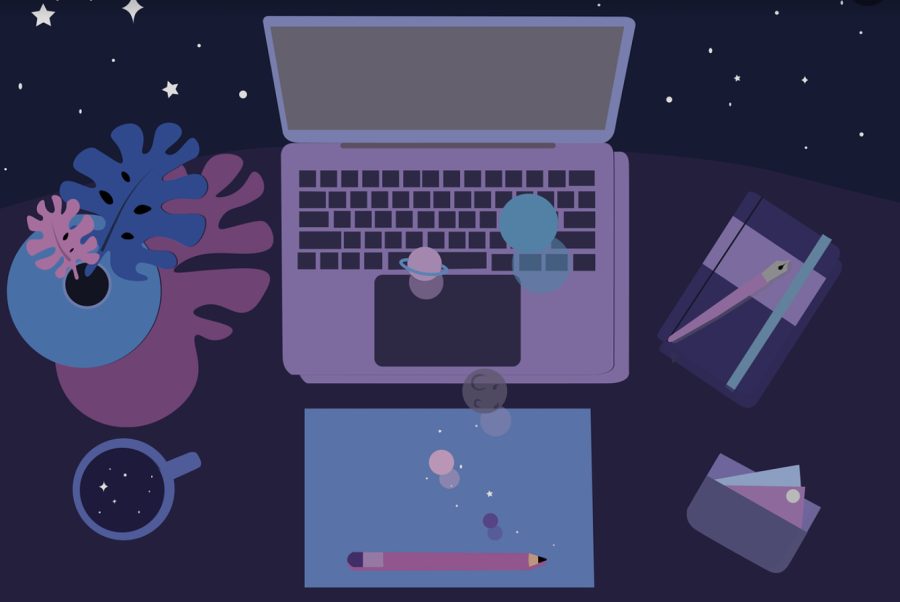STOP Procrastinating: Here’s How
Let me guess. AP exams are less than a week away, and you still haven’t really started studying (I’m looking at you, seniors). Have you spent more time overthinking than studying for AP exams or finals?
If that’s you, welcome, you’ve come to the right place. Don’t worry, everything’s going to be okay. The amazing Glenbard West staff are here to help. Here’s some tips and tricks on how to get best prepared! Now, this may sound familiar, but instead of going in with the attitude of ‘I’ve heard this before, I don’t need to hear it again,’ try to look at these methods with an open mind and consider what would work best for you.
Ms. Miller, head of the AP Cafe, offers a delightful study method for Glenbard students called P.H.C. – which stands for Planning ahead, Healthy, and Collaborative – a wonderful tool to prevent burnout and cultivate productive study habits.
Planning ahead
“One of my tutors gave me a great study guide to that takes 10 units of studying and [breaks] it down,” Ms. Miller shared with pride. She also offers a plan ahead list, in which she recommends sitting down, looking at when exams are and planning out the week.
Mrs. Smith, a Honors and A.P. Biology teacher, builds on this, recommending students to “make a daily list” with achievable goals so that students can accomplish more as they break down the content.
Ms. Rio, an AP Human Geography and AP U.S. History teacher, recommends “Make it realistic with the time [that you have]. Smaller, more frequent doses you’re scheduling in for yourself. Chunk the information.” She asks students to think of their studying like practicing for a performance or sport. “How many times do you touch the ball? How many times do you touch the content?” as the more often you look back at what you’ve learned, the more familiar you are with it. When you’re looking at all the units of the year, take note of what you struggled with or the older content that hasn’t been covered in a while to start off.
Healthy
Now, if you’re a couch potato like me and groaning a little bit at this one, don’t lose hope just yet. It’s not as bad as you think. “You don’t have to be hitting the gym and bulking up,” commented Ms. Rio laughingly. “There are easily accessible, free ways you can be getting exercise. Just go for a 10 minute walk.”
Sounds easy enough, right? Try even plugging in some headphones and studying in your backyard to get fresh air and studying done at the same time. Ms. Miller also brought in the consideration of what to eat to best help your memory at this time. Her top three foods were dark chocolate, oatmeal, and almonds.
“You need to nourish your body to maximize your brain,” added Ms. Rio. “Although when I was studying I loved having a bowl of skittles,” she shared. As a person who appreciates snacks, I definitely will be keeping a bowl of dark chocolate almonds near me as I’m studying. All interviewees were staunch supporters of sleep, in that they deemed it imperative for students success.
“When we’re tired, we can go from 0-60 in terms of panicking much faster,” Ms. Smith warned. “You have to sleep, get up early if you need to,” Ms. Miller encouraged students. Ms. Rio touched upon the impacts even blue light can have on your ability to rest properly. “Get off your screens an hour before you go to bed,” she advised. So the prudent thing to do is to put away your iPads and phones at night to get plenty of rest.
Collaborative
As much fun as a group chat with your friends created in the name of ‘collaboration’ would be, that may bring more harm than help. “Don’t sit there and think you’re gonna study for a couple hours and have your phone right next to you. It’s our human nature now you hear your phone buzz, you look at it,” Ms. Smith candidly informed readers.
Ms. Rio also supported this, saying “Distracted studying is a waste of everyone’s time. You might as well not study.” Instead, set those boundaries if you do decide to try and study with friends. Come to a compromise. ‘Let’s go over Unit 6, and then we can take a 10 minute break.’ Or agree to study by yourselves but then plan something together after exam season as something to look forward to as you’re preparing. Consider studying with a classmate rather than your closest friend.
“The best way you can learn is by teaching. That’s how you retain information,” Ms. Miller stated. However, collaboration doesn’t end with just fellow high schoolers. Students can collaborate with teachers as well.
Ms. Rio recommends students to be proactive, saying “Just start. You need to be in the driver’s seat. You are not a passenger in your own life.” Know exactly what you need assistance with and go ask your teacher for support.
“The biggest thing is reaching out for help,” Ms. Miller tells readers. “Use your supports given to you. There’s no reward for not reaching out for help. Once you verbalize it, it’s a game changer.”

Maariya Quadri is a senior at Glenbard West and an editor of The Glen Bard. In addition to newspaper, she enjoys baking, reading, and taking pictures of...










